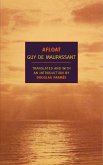'What makes Yonnet's memoir so special is the way the real and fantastic meet. After all, it is set during the Occupation, and the author was a Resistance hero. The secrets of Paris play a role in the struggle against the Germans and their collaborators. Thus, the occultist spiv Keep-on-Dancin' initiates Yonnet to a "psychic circuit" that enables him to unmask a Gestapo informer in "the room where only the truth can be told". Yonnet portrays Paris as a character in her own right: the city is "edgy", the Seine "sulks". The geography determines the behaviour of its inhabitants, and will live on after their deaths. Certain névralgique points in the city incite Parisians to raise barricades, be it during revolutions or the Liberation of 1944. But, like François Villon and Charles Baudelaire, Yonnet conveys the fragility of things. The yarns drunkenly spun in dive bars strive to conjure away a fundamental loneliness: "men are so isolated, prisoners of their own wretched selves, that they can be unbelievably sociable".' Gavin Bond in Scotland on Sunday 'Translated into English for the first time since its release in 1954, Yonnet's only published book is a macabre, savage account of life on Paris's Nazi-occupied Left Bank. Like Christopher Isherwood'' 1939 novel 'Goodbye to Berlin', this book sidelines conventional history in favour of anecdotal, autobiographical and brilliantly subjective snapshots of the city's marginalised 'human detritus' in a series of cinematic vignettes that straddle the real, the absurd and the supernatural...This is ultimately a unique panoramic memoir; an admiring but never sentimental love letter to the French capital destined to be loved in its turn by fans of film noir.' Alex Barlow in Time Out *****
Bitte wählen Sie Ihr Anliegen aus.
Rechnungen
Retourenschein anfordern
Bestellstatus
Storno








